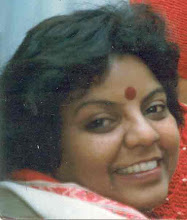
Nirupama Dutt with Manjit Tiwana, Pal Kaur and Manju
"Successor of Manjit, Daughter of Amrita"
September 1, 2006
Nirupama Dutt on poetry and prejudice, Partition and Punjab – and the charge of being a poet of experience rather than the imagination. In conversation with Arundhathi Subramaniam
AS: “Such are the constraints of/ poetesses of Amrita Pritam’s age/ A cigarette is their only solace!” I’m thinking of that line from your poem, ‘Laughing Sorrow’. What are the challenges, in your opinion, of belonging to a generation of post-Independence Punjabi women poets? Have you had to consciously carve out a creative space for yourself in the mainstream?
ND: The curious scenario of Punjabi literature (and this would apply to other Indian languages too) was very male-dominated, with one major exception – that of Amrita Pritam. Otherwise, men would only promote mediocre writing by women and these women would be part of their camp – and very often their bedmates! A woman writing on her own, publishing and getting recognition was not something they could digest. A major talent like Amrita Pritam had to suffer many prejudices. After her, one major poet that Punjabi has had is Manjit Tiwana, now 62, and she was always a target of male wrath – largely for speaking out as a woman. In the world of Punjabi letters I see myself as a successor of Manjit and a daughter of Amrita… .
I started publishing in Punjabi, the first break coming in Amrita Pritam’s Nagmani magazine in 1980. Before that I wrote and published in English.
I came from a world that was larger than Amrita or Manjit’s. Being some kind of a ‘star’ journalist, I was ‘empowered’ and had tremendous support from my mother and other members of the family, and was also a beneficiary of a western education. Yet what I shared with Amrita and Manjit was the ‘pain’ of being a woman and constantly struggling in a hostile world.
My poetry was thus more open, fearless, and I was conscious not to see myself as a ‘victim’. I wrote less [than they did] with much of my energy being taken up by journalism. I published my book in 1995 – Ik Nadi Sanwali Jahi. This collection of poetry made an impact. Seminars were organised by different groups (to which I was invited) and a new voice was welcomed. It also got me the Delhi Punjabi Akademi award. In poetry, I feel the poet just has to write and if the poems have power, the mainstream will come to you. And if it doesn’t in your lifetime, never mind. For literature is a long process. The most important thing is that it be written.
Consciously, I tried to move into spaces left untouched by those who came before me – both male and female. In fact, I wormed my way into Punjabi literature. And now I am there to stay, with a lot of love coming my way. A letter by some student of an obscure village about my poem makes my day.
AS: You are working on a book on the post-Partition social history of Punjab. How do you think the geo-politics of the region has shaped your poetry?
ND: The geo-politics of the region have shaped my destiny as they did that of many others. Partition becomes a major point of reference. And I was the daughter of a family that had migrated from Lahore. Much was lost (during the trauma of Partition) so education for the daughters became important, as well as economic independence. During my recent visits to Pakistan, I found out that the ‘Dutts’ were the original inhabitants of Lahore – and felt happy that I was an original Lahoran. Literature is all about roots and wings.
AS: Would you like to say something about literary influences that have been important to you? Have there been any specific writers — Punjabi, or otherwise — who have moulded your poetic practice?
ND: I love reading poetry. And my youth was steeped in poetry – English, Urdu, Hindi and later Punjabi. As for the structure of my poems, I have been influenced by two male poets – Kumar Vikal of Hindi and Surjit Patar of Punjabi – but the thoughts and experiences (that my poetry expresses) have been entirely my own. Punjabi critics say that I am a poet not so much of imagination as of experience.
AS: Your poetry seems to combine a note of elegy with a strong sense of female agency and empowerment.
ND: Yes, I am proud of being a woman and I have always tried to write like a woman.
AS: How do you see the role of the personal in poetry? Would you consider your work to be consciously confessional?
ND: The personal is an important part of my politics and my literature. Confessional? Here I’m tempted to copy Oscar Wilde and say that I have nothing but my originality to confess! AS: You practise both poetry and short fiction. What for you are the challenges and rewards of each genre? ND: Short fiction and personal prose have brought me a larger audience and appreciation but it is penning a poem, and penning it well, that gives me joy.
June, 2006












